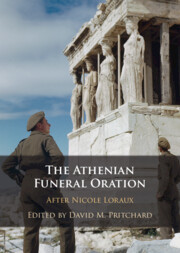Book contents
- The Athenian Funeral Oration
- The Athenian Funeral Oration
- Copyright page
- Contents
- Figures and Tables
- Contributors
- Foreword
- Preface
- Abbreviations
- 1 The Funeral Oration after Loraux
- Part I Contexts
- Part II The Historical Speeches
- Part III The Literary Examples
- Part IV Intertextuality
- Part V The Language of Democracy
- 17 The Funeral Oration as a Self-Portrait of Athenian Democracy
- 18 Sailors in the Funeral Oration and Beyond
- 19 ‘Freedom Is the Sure Possession’: Modern Receptions of Pericles’ Funeral Oration
- References
- General Index
- Index of Sources
18 - Sailors in the Funeral Oration and Beyond
from Part V - The Language of Democracy
Published online by Cambridge University Press: 11 January 2024
- The Athenian Funeral Oration
- The Athenian Funeral Oration
- Copyright page
- Contents
- Figures and Tables
- Contributors
- Foreword
- Preface
- Abbreviations
- 1 The Funeral Oration after Loraux
- Part I Contexts
- Part II The Historical Speeches
- Part III The Literary Examples
- Part IV Intertextuality
- Part V The Language of Democracy
- 17 The Funeral Oration as a Self-Portrait of Athenian Democracy
- 18 Sailors in the Funeral Oration and Beyond
- 19 ‘Freedom Is the Sure Possession’: Modern Receptions of Pericles’ Funeral Oration
- References
- General Index
- Index of Sources
Summary
Ancient historians regularly argue that the classical Athenians held sailors in much lower esteem than hoplites. They cite in support of this the extant funeral speech of Pericles. Certainly, this famous speech said a lot about courageous hoplites but next to nothing about sailors. Yet, it is also clear that this was not a typical example of the genre. Funeral speeches usually gave a fulsome account of Athenian military history. In rehearsing military history, funeral speeches always mentioned naval battles and recognised sailors as courageous. Old comedy and the other genres of public oratory depicted sailors in the same positive terms. All these non-elite genres assumed that a citizen fulfilled his martial duty by serving as either a sailor or a hoplite. They used a new definition of courage that both groups of combatants could easily meet. In tragedy, by contrast, characters and choruses used the hoplite extensively as a norm. In spite of this, tragedy still recognised Athens as a major seapower and could depict sailors as courageous. In Athenian democracy, speakers and playwrights had to articulate the viewpoint of non-elite citizens. Their works put beyond doubt that the Athenian people esteemed sailors as highly as hoplites.
- Type
- Chapter
- Information
- The Athenian Funeral OrationAfter Nicole Loraux, pp. 376 - 413Publisher: Cambridge University PressPrint publication year: 2024



